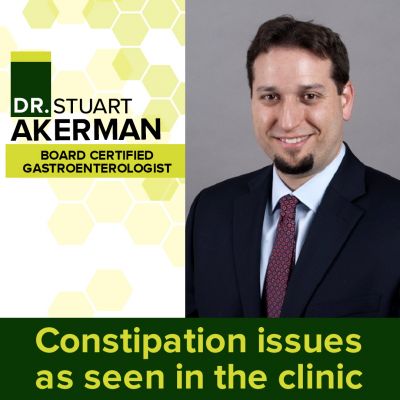Constipation Issues As Seen In The Clinic

Dr. Stuart Akerman is a Board Certified Gastroenterologist and happily married father of 3 beautiful girls. When he is not actively working alongside his patients he can be found playing a game of pickup basketball, volunteering in the community, or sharpening his skills on Just Dance with his daughters. You can learn more information about Dr. Akerman at his website www.stuartakermanmd.com
Constipation can be a very frustrating reality of life for many individuals. Everyone at some point will experience constipation due to variations in fiber and water intake, but when this occurs for more than a few weeks, it would be considered chronic. Chronic constipation can cause abdominal pain, bloating, nausea, vomiting, and often will contribute to Internal Hemorrhoid formation – which may then result in rectal bleeding if the hemorrhoids become irritated.
Constipation when chronic may also lead to the development of diverticulosis, which are pouches forming in the wall of the colon from pressure leading to wall muscle weakness. These pouches can bleed, become infected, or worse. This is a good reason to be able to identify when you are suffering from chronic constipation, and seek evaluation if it is not improving.
How do you define constipation? When should it be considered?
When you ask many people to define constipation, you will typically get one of a few answers –
- They have hard, sometimes pellet-like stools,
- they have significant straining,
- or that they may go multiple days between bowel movements.
All of these are great examples of constipation, but did you know that there are others? Some of the more subtle signs of constipation are a “sense of incomplete evacuation”. This can occur when someone has a bowel movement but doesn’t quite feel that they have emptied completely. Alternatively, they may pass stool but find that they require excessive wiping to become clean.
Even if the stool is soft, this still represents constipation, because residual stool is remaining in the rectum, resulting in an incomplete evacuation. This may come as a surprise to many patients who schedule a consultation for diarrhea, but walk out with recommendations for treating their constipation!
What are some of the common causes of chronic constipation?
Constipation may occur due to varying reasons, and sometimes the treatments may be tailored to the specific cause. As a general rule, it is a good idea to make sure that you have sufficient water intake, as well as a robust fiber intake in your diet. Foods high in fiber include green vegetables, fruits with skin such as apples, pears, and the like (make sure you eat the skin – that’s where the fiber is hiding!), and whole grains. If you are unsure that you are consuming an adequate amount of fiber, a fiber supplement is something to consider, but it should not completely replace your dietary fiber intake.
While constipation often occurs due to dietary factors, other issues may be at hand as well.
Some of the more common reasons include:
- slow transit constipation, where the stool moves slowly through the colon.
- A slow gut due to infections
- certain neurologic issues (which are more common in children)
- thyroid disease (as a generalization a slow thyroid leads to constipation while a ramped up thyroid leads to diarrhea)
- colon narrowings or growths would be more of a concern for someone who had a sudden onset of constipation/change in their bowel habits and therefore should receive a more urgent evaluation.
If you have experienced a recent significant change in your bowel habits, whether or not accompanied by other symptoms such as rectal bleeding or weight loss, you should contact your gastroenterologist for an urgent evaluation.
How do you evaluate chronic constipation? What is involved in a workup?
When evaluating chronic constipation in a patient without alarm symptoms such as those mentioned above, your gastroenterologist may check some blood work, especially thyroid studies.
Some testing to characterize the type of constipation such as a Sitz Mark study may be considered. In a Sitz Mark study, you would take an Abdominal XRay, and then be given a pill to swallow. The pill would contain 20 – 25 little radiographic (easy to see on xray) markers. You would then be asked to return the next day for another XRay to see the pattern that the markers have spread out – are they throughout the colon, bunched up in one area, or are they already expelled? If they are still present, you may be asked to return again in another day or two to repeat the XRay again and evaluate the pattern. This would help your gastroenterologist to determine if medications (and which ones) would be helpful, or if further testing would be warranted.
Can chronic constipation be treated, or is this just something I have to live with?
Thankfully nowadays there are many options for patients suffering from chronic constipation. Just like treatments for many gut issues, patients do best by combining medical therapies with diet, exercise, and sometimes supplements.
Before starting with a specific regimen, it may make sense to try and clean out the colon to allow it to “reset”. Medications that promote motility, soften stools, and/or stimulate water secretion into the gut are available and are well tolerated in general.
For many patients, treatment of underlying constipation in conjunction with therapies such as Atrantil, which focuses on decreasing gut sensitivity and relieving gas and bloating, provides for a winning strategy. While there is unfortunately not a one-size-fits-all fix, your gastroenterologist may have some great options available to work with you towards the goal of a healthy gut.
Tips for Surviving the 2020 Holiday Season with Digestive Issues